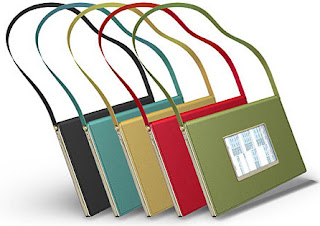“Razor” Notebooks Coming Closer
Category: Mobile
by Anton Shilov
[ 05/24/2007 09:30 PM ]
Intel Corp., the main producer of microprocessors and supporting components for notebooks, has teamed up with Ziba Design firm to create code-named Metro laptop, which will be nearly as thin as Motorola Razr cell phone, but which will sport rather powerful functionality under the hood.
Nowadays it is hard to impress anyone with technology itself, as modern computers are so powerful that very few people require all their advantages, such as multi-core processors, ultra-powerful graphics cards and realistic sound. The vast majority of customers use their systems for rather simplistic tasks: Internet browsing, communications, office work and so on, which do not need exceptional performance. But those users, mostly located in North America, Japan or Western Europe, demand to have something, which is pleasant to see and feel, something that cheap notebooks hardly provide. As a result, exclusive and stylish computers have been slowly emerging on the market in the recent years.
The Metro notebook, which is, according to BusinessWeek, the world’s thinnest laptop, has been designed by Intel Corp. and Ziba Design, the second time when the world’s largest maker of x86 microprocessors teams up with a design firm to develop a personal computer (PC). This time, however, the machine may actually be produced by one of Intel’s partners.

Intel’s Metro notebook is 0.7” (1.778 centimeters) thick and has 2.25 pounds (1.02 kilograms) weight, the thickness very close to that of Motorola Razr and weight that barely exceeds that of a handbag. The laptop may be made of magnesium alloy and covered with leather. In addition, it features SideShow display on its front cover, something, which is currently offered only on select notebook models from Asustek Computer.

Sales of laptops priced at $2000 and above are rising 1.4% a year, compared with 73.5% compound annual growth rate for notebooks priced $500 to $999, according to researcher IDC. Therefore, it is crucial for chipmakers and notebook manufacturers to get into the market of high-end machines, as they not only carry good margins, but also popularize the brand-name.


































































![YayERxXx luph JC [19/o1/9o]](http://i17.tinypic.com/6gwyadg.gif)
















 Love Me? Click Here
Love Me? Click Here












